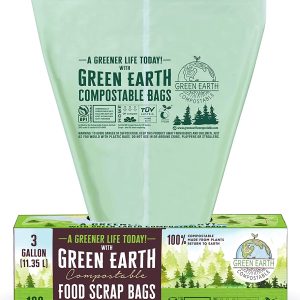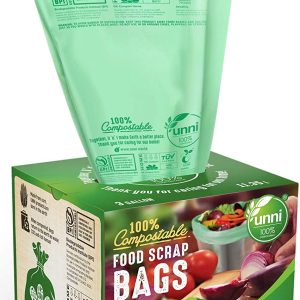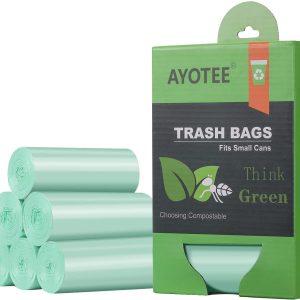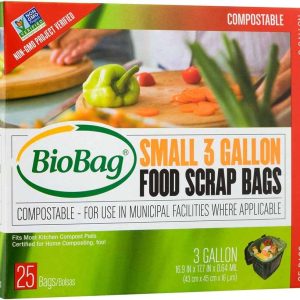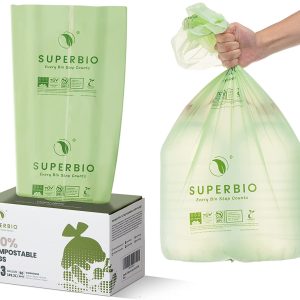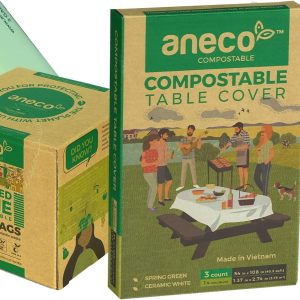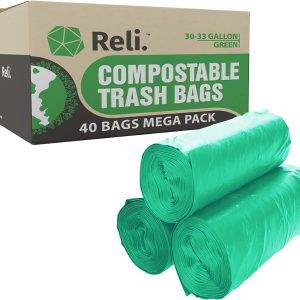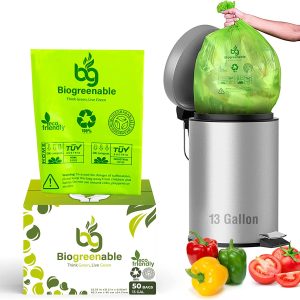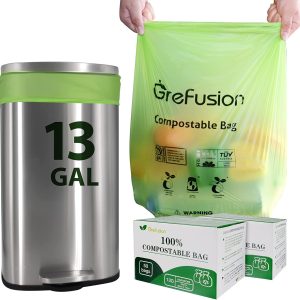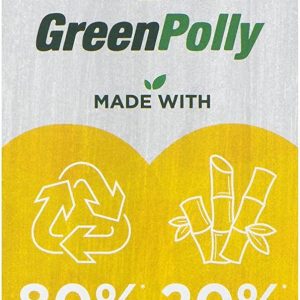Compostable Trash Bags
Every year Millions and Millions of metric tons of plastic end up in Ocean as their ultimate destination. Plastic bags and various single use plastics start out as fossil fuels and end up as deadly waste in landfills and the ocean. For hungry sea animals, it’s impossible to differentiate between jellyfish and floating plastic shopping bags. Fishes eat thousands of tons of plastic a year, transferring it up the food chain to bigger fish and marine mammals and then to Human beings. Worldwide shoppers use around 500 Billion of single use plastic bags per year, whereas the average American family takes home 1500 Plastic shopping bags home per year. But the fact is only 1 percent of plastic bags are returned to recycling center and rest all are making it to the landfills and then to oceans. It can take few hundreds of years for these plastic bags to breakup and those doesn’t break down, turn into polymers and toxic chemicals and approximately 100,000 marine creatures die a year from plastic entanglement. Even though the life expectancy of these plastic bags is hundreds of years before they break down, the average actual usage of these bags is only 12 minutes. An initiative to adopt a zero-waste lifestyle and using Compostable and Biodegradable trash bags is really inspiring. Composting is the most impactful way to do this as they reduce greenhouse gas emissions and replenish our soils, reducing warming effects on the climate. Compostable garbage bags made of plant based materials can break down completely not only in industrial facilities but also in home system. At Buyeko you can find various Non Plastic Biodegradable and Compostable Trash Bags which are good for you and Planet!!!
Breaking Down Barriers: How Compostable Bags Champion Ocean Conservation and Environmental Harmony
Eco-friendly compostable trash bags offer several benefits compared to regular plastic trash bags, particularly in terms of their impact on the environment and oceans. Here are some key points to consider:
1. Biodegradability and Compostability:
- Eco-friendly compostable trash bags are made from biodegradable materials, such as plant-based plastics (PLA) or other renewable resources.
- They break down more quickly and naturally compared to traditional plastic bags, which can take hundreds of years to decompose.
2. Reduced Plastic Pollution:
- Plastic pollution is a significant problem for the environment and oceans. Regular plastic bags often end up in landfills or as litter, causing harm to wildlife and ecosystems.
- Compostable bags help reduce the accumulation of plastic waste and its negative impact on the environment.
3. Minimized Carbon Footprint:
- Compostable bags are generally made from renewable resources, which can have a lower carbon footprint compared to petroleum-based plastics used in regular trash bags.
- Manufacturing compostable bags often produces fewer greenhouse gas emissions.
4. Contribution to Soil Health:
- Compostable bags can be used to collect organic waste and food scraps, which can then be composted along with the bag.
- The compost produced enriches soil quality and promotes plant growth, reducing the need for chemical fertilizers.
5. Marine and Wildlife Protection:
- Regular plastic bags can easily find their way into water bodies and oceans, where they harm marine life and contribute to the formation of microplastics.
- Compostable bags are less likely to persist in marine environments, reducing the risk of ingestion by marine animals and the overall impact on aquatic ecosystems.
6. Support for Circular Economy:
- Compostable bags are often designed to fit within a circular economy model, where materials are designed to be regenerative and reusable.
- Properly composted bags can contribute to creating nutrient-rich soil, closing the loop on waste disposal.
7. Consumer Awareness and Behavior:
- The use of compostable bags encourages consumers to be more mindful of their waste and disposal practices.
- It promotes a shift toward more sustainable choices and lifestyles.
8. Government and Industry Incentives:
- Some governments and industries provide incentives for using compostable bags or impose regulations to reduce plastic waste.
- This encourages businesses and individuals to opt for more eco-friendly alternatives.
While eco-friendly compostable bags have numerous advantages, it’s important to note that their benefits are most significant when they are used and disposed of correctly. Compostable bags often require specific composting conditions to break down properly. If they end up in regular landfill environments, their biodegradation may be slow, and the benefits may not be fully realized. Therefore, education about proper disposal methods and the importance of composting is essential to maximize the positive impact of compostable bags on the environment and oceans.

